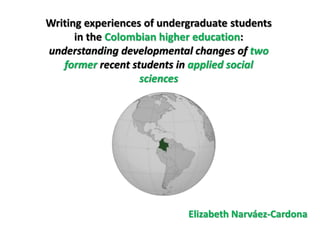
Final presentation elizabeth narváez cardona
- 1. Writing experiences of undergraduate students in the Colombian higher education: understanding developmental changes of two former recent students in applied social sciences Elizabeth Narváez-Cardona
- 2. Context of the inquiry project This exploratory project arises in the context of the emerging field on teaching and researching on higher education writing in Colombia.
- 3. Context of the inquiry project 1. Regarding public policies, the government has decreed since 2010 assessing compulsorily undergraduate students in their last year of the programs before obtaining their degrees. The assessment on writing abilities in Spanish is one of the components of this public policy.
- 4. Context of the inquiry project 2. Some studies have reported that Colombian higher education is not providing extensive or curriculum resources to learn how to write across undergraduate experiences, neither the emerging field has conducted developmental studies to explore across time what is undergoing with the students in their tertiary experiences.
- 5. Justification Consequently, the field on Colombian higher education writing lacks of conducting developmental studies enabling to boost curriculum debates as well as discussions upon the current scopes of the external large scale assessment on writing.
- 6. The project scope The current pilot project aims at understanding developmental changes of two former recent students in applied social sciences in Colombian Higher Education.
- 7. Project goals The research aims are: a) Describing narratives on undergraduate writing experiences from student perspectives; b) Inferring potential relationships between undergraduate writing experiences and writing tasks of the current large scale assessment; c) Identifying commonalities and differences between undergraduate writing experiences and workplace writing experiences.
- 8. Methodological approach Two former outstanding recent undergraduate students of my home university were asked for participating voluntarily. Data collection was conducted in Spanish through a questionnaire as well as writing samples. This project asked for the participants to create a small portfolio with: The most difficult, the easiest, and the most meaningful texts that were written during their undergraduate experiences. Given their professional experiences so far, they also were asked for selecting a successful text.
- 9. Methodological approach Textual analysis was conducted in the following stages: 1) The questionnaires were read to find differences and commonalities between the two narratives of the participants: writing challenges processes or other participants involved in their writing experiences constrains for writing argumentative texts emotions and identities tied to writing.
- 10. Methodological approach The writing samples were read and analyzed based on a rubric with qualitative criteria: Topic Year of studies in which the document was written Document length Genre Possible strategies used to write at that time Textual structure Writer identity emerging according to the type of writing This textual analysis of the writing samples aimed at describing the documents, rather than evaluating positively or negatively their linguistic and rhetorical features.
- 11. Chronological context of the cases Findings and participants´ profiles
- 12. Commonalities and differences between Findings undergraduate writing experiences
- 13. Commonalities and differences between Findings undergraduate writing experiences
- 14. Commonalities and differences between Findings large-scale assessment writing experiences
- 15. Commonalities and differences in the Findings workplace writing experiences A successful text
- 16. Summary of the main changes identified in the Findings participants’ writing samples
- 17. Conclusions, reflections & implications The undergraduate writing experiences The undergraduate writing experiences of both participants seem not having focused on specialized written genres neither for academic settings or professional contexts. These former students mostly were using writing in higher education to learn rather than learning how to write.
- 18. Conclusions, reflections & implications The undergraduate writing experiences However, the participants highlighted that their research reports were valuable writing experiences. This might suggest that further research projects could be conducted to explore what and how institutional practices are carrying on reading and writing practices for this type of genre in Colombian higher education.
- 19. Conclusions, reflections & implications The large-scale assessment writing experiences The public report released by the Colombian government in 2012 asserts that the best scores on writing had been obtained by students in humanities, social sciences, journalism, and advertising. The hypothesis emerging from this project is that the actual Colombian curricula in Journalism are obviously tied to writing practices. Further research projects are needed to explore how writing development ensues in Journalism according to Colombian curricula.
- 20. Conclusions, reflections & implications The large-scale assessment writing experiences The public guidelines of the large-scale assessment on writing have asserted that what is assessed is the preparedness of the undergraduate students to fulfill the workplace writing demands (ICFES, 2012). This project shows that the type of writing demanded by the test is far for being the type of writing demanded in workplace settings.
- 21. Conclusions, reflections & implications The workplace writing experiences Clearly, in both cases, the participants are coping currently with professional communication genres given their responsibilities in their workplaces. According to the writing samples analyzed, it is evident that the participants have undergone sharp growth and changes to fulfill their workplace writing demands.
- 22. Conclusions, reflections & implications Given that most of their undergraduate experiences seem having been focused on writing to learn rather than learning how to write, further research projects are needed to explore how these former students have tackled the transition and transferability between their undergraduate and workplace experiences, which seem having entailed strong ruptures.
- 23. Conclusions, reflections & implications Finally, since these participants were outstanding students, further research projects to collect the same type of data could be useful to explore differences among disciplines, as well as among “average” students with disabled students.